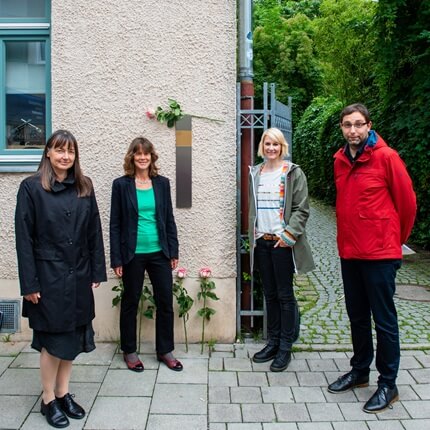Ernst Richard Zöbisch was born on June 3, 1881 in Rebesgrün, Saxony. His parents, the mason Emil Zöbisch and the quilt sewer Anna Auguste Pinkes, first married a few days after his birth, on June 9, 1881. Little is known about Ernst Zöbisch’s life. In 1906 he married Regina Eder, née Lipp, a widow 23 years his elder. The couple lived at Tulbeckstraße 17 in Munich from June 1917. After Regina Zöbisch’s death, Ernst Zöbisch married for a second time in 1931: Maria Merkl, born in 1896, worked as a maid and was living at Kazmairstraße 28 when they got married. On August 31, 1942 Ernst Zöbisch was arrested by the Nazis for “continued deception.” He was sent to the police prison in Ettstraße. He was most likely tortured, because he was admitted to the infirmary at Stadelheim prison a few days after his arrest. On November 21, 1942 the Gestapo (Secret Police) moved him to Dachau concentration camp. Able to receive money due to his status as “protective custody” prisoner, Ernst Zöbisch could buy grossly overpriced and poor quality items in the concentration camp. On January 3, 1944 the SS deported 1,000 seriously ill prisoners deemed unfit for work ‒ categorized in SS jargon as “invalids” ‒ to the concentration and extermination camp complex at Majdanek. Ernst Zöbisch was one of the contingent. Twenty-nine men died on the three-day journey in the freezing winter conditions. The living conditions in Majdanek were catastrophic and far worse than those in the concentration camps in the German Reich. By April 1944, at least 469 prisoners of the transport from Dachau had died. The SS murdered Ernst Zöbisch on March 13, 1944. The circumstances of his death are unknown. The official cause of death stated “circulatory disorders resulting from blood vessel damage.” The concentration camp administration informed Ernst Zöbisch’s wife Maria of his death by letter: “Your husband reported ill on 1.7.1944 and was placed under medical attention in the sickbay. ... Despite every effort by the doctors, it proved impossible to bring the illness under control.” (text Lena Lang, editor C. Fritsche,translation P. Bowman)




